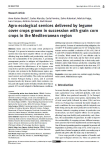Boulet A.K., Alarcao C., Ferreira C., Kalantari Z., Veiga A., Campos L., Ferreira A., Hessel R. (2021). Agro-ecological services delivered by legume cover crops grown in succession with grain corn crops in the mediterranean region. Open Agriculture, 01/01/2021, vol. 6, n. 1, p. 609-626.
https://doi.org/10.1515/opag-2021-0041
https://doi.org/10.1515/opag-2021-0041
| Titre : | Agro-ecological services delivered by legume cover crops grown in succession with grain corn crops in the mediterranean region (2021) |
| Auteurs : | A.K. Boulet ; C. Alarcao ; C. Ferreira ; Z. Kalantari ; A. Veiga ; L. Campos ; A. Ferreira ; R. Hessel |
| Type de document : | Article |
| Dans : | Open Agriculture (vol. 6, n. 1, January 2021) |
| Article en page(s) : | p. 609-626 |
| Langues : | Anglais |
| Langues du résumé : | Anglais |
| Catégories : |
Catégories principales 06 - AGRICULTURE. FORÊTS. PÊCHES ; 6.6 - Technique Agricole (sols, engrais, mécanisation)Thésaurus IAMM AGROECOLOGIE ; PLANTE DE COUVERTURE ; SYSTEME DE CULTURE ; MAIS ; LEGUMINEUSE A GRAINS ; LESSIVAGE DU SOL ; MAUVAISE HERBE ; FERTILITE DU SOL ; DEGRADATION DU SOL ; MATIERE ORGANIQUE DU SOL ; REGION MEDITERRANEENNE ; PORTUGAL |
| Résumé : | Grain corn is the main cereal produced in Portugal. It is grown in intensive monoculture cropping systems that may have negative effects on soil quality, affecting long-term fertility and productivity, and, therefore, the sustainability of the production. A promising management practice to mitigate soil degradation is to grow winter cover crops used as green manure. This study examined the effectiveness of six legume cover crops (LCCs) species in providing agro-ecological services for grain corn systems in the Mediterranean region, specifically in terms of nutrient leaching, nutrient recycling, weed control, and soil fertility. The study was performed in Central Portugal during 2 years, and it assessed legumes/weeds dry biomass yield, their nutrients content, and soil organic matter evolution. Results show that, in general, LCC are well adapted to Mediterranean conditions, yielding large amounts of biomass (up to 8 ton/ha for some clover species). In terms of nutrient leaching mitigation, the overall N–P–K nutrient uptake was 176–20–172 kg/ha. Green manure services enabled a reduction of 35% of N, 50% of P, and 100% of mineral fertilizers for a grain corn production of 12 ton/ha. Weed control by LCC was effective only in the second year of the study and for three clover species (crimson, balansa, and arrowleaf) due to their early establishment and/or high biomass production competing with weeds. Soil fertility was not improved in the short term, LCC incorporation into the soil to a slight depletion of the soil organic matter content. |
| Cote : | En ligne |
| URL / DOI : | https://doi.org/10.1515/opag-2021-0041 |







